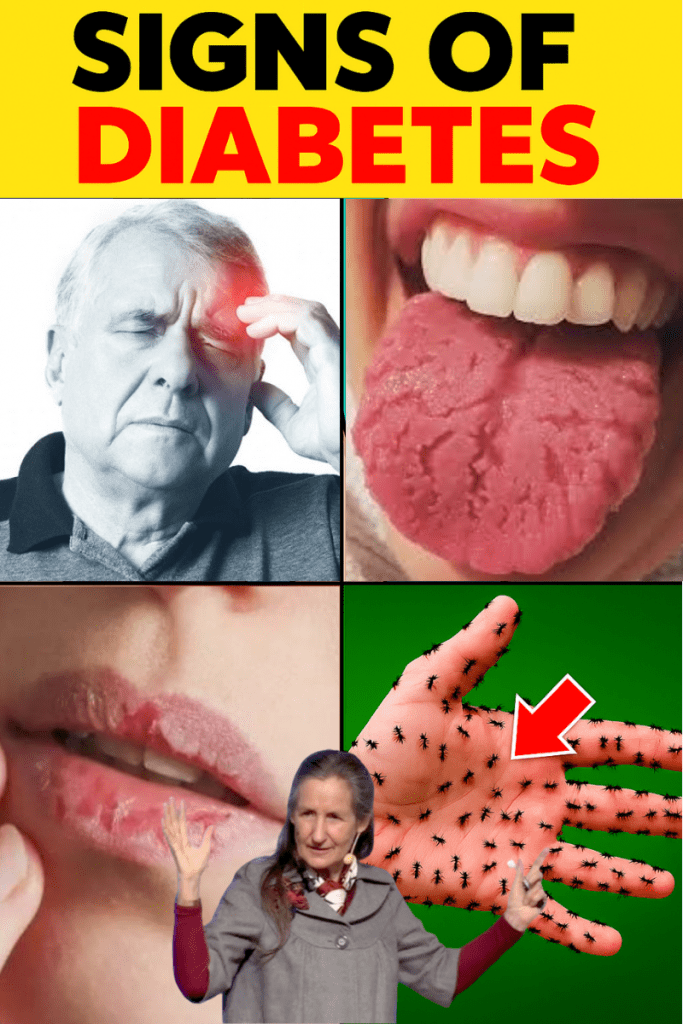Diabetes is a stealthy condition, often lurking in the shadows without a single obvious clue. It’s called the “silent killer” for a reason—millions live with it, unaware, as its subtle symptoms blend into the chaos of daily life. Type 2 diabetes, in particular, can creep up so gradually that you might dismiss the warning signs as stress, aging, or just “feeling off.” But here’s the truth: catching it early could change everything. From saving your health to potentially reversing the condition, recognizing these hidden signals is your first step toward taking control. Ready to uncover the signs you might be overlooking? Let’s dive into the 20 silent symptoms that could mean diabetes is hiding in plain sight.

😓 1. Unquenchable Thirst That Won’t Quit
Ever feel like no amount of water satisfies your thirst? You’re chugging glass after glass, yet your mouth still feels like a desert. This isn’t just a quirk—high blood sugar levels could be pulling fluids from your tissues, leaving you perpetually dehydrated. It’s your body’s desperate attempt to balance itself, and it’s a major red flag.
🚻 2. Constant Bathroom Trips, Especially at Night
Are you waking up multiple times to use the bathroom? Frequent urination, particularly at night, is a classic sign of diabetes. Your kidneys are working overtime to flush out excess sugar, sending you on endless trips to the restroom. If this sounds familiar, it’s time to pay attention.
😴 3. Bone-Deep Fatigue That Drags You Down
Feeling exhausted despite getting enough sleep? Chronic fatigue is more than just a busy schedule. When your blood sugar is unstable, your body struggles to convert food into usable energy, leaving you drained. If you’re constantly fighting to stay awake, diabetes could be the culprit.
⚖️ 4. Weight Dropping for No Reason
Losing pounds without trying might sound like a dream, but it’s a potential warning sign. If your body can’t use glucose properly, it may start burning fat and muscle for energy, leading to unexpected weight loss. This isn’t a healthy win—it’s a signal something’s wrong.
👁️ 5. Blurry Vision That Comes Out of Nowhere
Struggling to read signs or see clearly? High blood sugar can cause the lenses in your eyes to swell, distorting your vision. This blurriness might come and go, but if ignored, diabetes could cause permanent damage to your eyesight. Don’t brush this off.
🩹 6. Wounds That Just Won’t Heal
A small cut or scrape that lingers for weeks isn’t normal. Diabetes can impair blood circulation and weaken your immune system, slowing the healing process. If your injuries seem to take forever to close up, it’s a sign your body might be struggling with high glucose levels.
🫶 7. Tingling or Numbness in Your Hands and Feet
Ever feel a strange “pins and needles” sensation in your extremities? This could be peripheral neuropathy, a type of nerve damage caused by prolonged high blood sugar. It often starts subtly but can worsen, so don’t ignore those odd tingles.
🦠 8. Infections That Keep Coming Back
Frequent infections—whether skin, gum, bladder, or yeast—aren’t just bad luck. High blood sugar creates a perfect environment for bacteria and fungi to thrive. If you’re battling recurring infections, especially in warm, moist areas, diabetes could be fueling the problem.
🖤 9. Dark, Velvety Skin Patches
Noticed dark, velvety patches on your neck, armpits, or groin? This condition, called acanthosis nigricans, is a visible sign of insulin resistance, a precursor to Type 2 diabetes. It’s not just a cosmetic issue—it’s your body waving a warning flag.
🍽️ 10. Hunger That Persists After Meals
You just ate a full meal, but you’re still ravenous. Sound familiar? When your body can’t efficiently turn food into energy, it sends hunger signals even when you’re full. This insatiable appetite is a subtle but serious clue that diabetes might be at play.
🥵 11. Dry Mouth and Itchy Skin That Won’t Quit
Dry mouth and persistently itchy, flaky skin aren’t just annoyances. High blood sugar can dehydrate your body, drying out your mouth and leaving your skin irritated. If moisturizers and lip balm aren’t helping, it’s time to consider a deeper cause.
🤕 12. Headaches That Keep Coming Back
Frequent headaches aren’t always about stress or dehydration. Fluctuating blood sugar levels can trigger recurring headaches, especially when paired with other symptoms on this list. If you’re popping painkillers too often, it’s worth investigating.
😣 13. Mood Swings That Feel Out of Control
One minute you’re fine, the next you’re snapping at everyone. Unstable blood sugar can wreak havoc on your emotions, causing irritability or sudden mood shifts. If you’re feeling unusually on edge, diabetes could be messing with your mind.
😴 14. Restless Nights and Poor Sleep
Struggling to get a good night’s rest? Diabetes can disrupt sleep through frequent urination, restless legs, or nerve discomfort. If you’re tossing and turning or waking up exhausted, your blood sugar might be keeping you up.
💑 15. Sexual Dysfunction That’s Hard to Ignore
Reduced libido or erectile dysfunction can be more than just stress or aging. Diabetes damages nerves and blood vessels, impacting sexual performance in both men and women. If intimacy is becoming a challenge, it’s a sign to get checked.
👃 16. Sweet, Fruity Breath Odor
A sweet or fruity smell on your breath might seem harmless, but it’s a serious warning. This can signal diabetic ketoacidosis, a dangerous condition where your body burns fat too quickly due to high blood sugar. This is an emergency—don’t wait to act.
🧠 17. Brain Fog and Trouble Focusing
Can’t concentrate or feel like your brain is in a haze? Uncontrolled blood sugar can impair cognitive function, leading to difficulty focusing or remembering things. If “brain fog” is a frequent visitor, it’s time to look deeper.
🦠 18. Yeast Infections That Won’t Stop
Recurring yeast infections, especially in warm, moist areas, are a red flag. Yeast thrives on excess glucose, and high blood sugar creates the perfect breeding ground. If these infections keep coming back, diabetes could be the underlying cause.
👁️ 19. Vision That Fluctuates Day to Day
One day your vision is sharp, the next it’s blurry. This back-and-forth is a hallmark of blood sugar imbalances. The lenses in your eyes are sensitive to glucose spikes, causing temporary vision changes that shouldn’t be ignored.
🧬 20. A Family History of Diabetes
Even if you feel fine, a family history of diabetes puts you at higher risk. Genetics play a big role, and if your parents or siblings have diabetes, you’re more likely to develop it. Pair this with any of the above symptoms, and it’s time to take action.

🩺 When to See a Doctor
Spotting just one of these signs might not mean much, but if you’re noticing two or more, don’t wait. A simple blood test can reveal whether diabetes is lurking. Early detection opens the door to better management through diet, exercise, medication, or lifestyle changes. The sooner you act, the more control you’ll have over your health.
💡 Why You Can’t Ignore These Signs
Diabetes doesn’t announce itself with a single, dramatic symptom. It sneaks in, blending into your everyday life until the damage becomes harder to reverse. But here’s the good news: you have the power to catch it early. By paying attention to these subtle clues, you can take charge of your health before complications like heart disease, kidney damage, or vision loss set in. Knowledge is your weapon, and acting now could be a game-changer.
🥗 Take Control of Your Health Today
You don’t need a diagnosis to start making positive changes. Small steps like cutting back on sugary foods, adding more movement to your day, or scheduling a check-up can make a massive difference. Diabetes might be silent, but it’s not invisible. Listen to your body, watch for these signs, and act before it’s too late. Your future self will thank you.
🔍 Final Thoughts: Don’t Let Diabetes Sneak Up on You
The signs of diabetes are easy to miss, but they’re not impossible to spot. From unquenchable thirst to unexplained fatigue, your body is trying to tell you something. Don’t brush it off as “just life.” By staying vigilant and proactive, you can catch this silent condition early and take back control. Whether it’s tweaking your lifestyle or seeking medical advice, every step counts. Are you ready to listen to your body and act? Your health is worth it.









